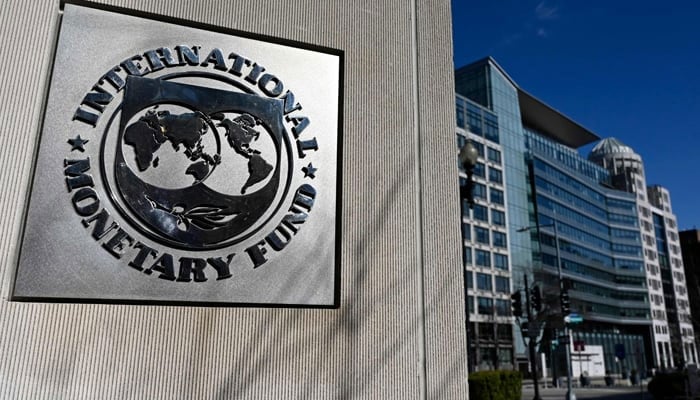First round of technical talks with IMF concludes
IMF supposed to share nine tables with Pakistani authorities which will pave way for holding policy-level talks next week
ISLAMABAD: Pakistan and the IMF Friday accomplished the first round of technical level talks and now the Fund is supposed to share nine tables — comprising macroeconomic and fiscal framework — with the Pakistani authorities which will pave way for holding policy-level talks next week.
If Pakistan and the IMF reach consensus on prescriptions to fix the economy by February 9, then the two will sign a staff-level agreement.
The authorities have massively revised downward the macroeconomic framework and shared it with the IMF under which the real GDP growth is projected to slash from 5 percent to 1.5 to 2 percent while inflation is going to escalate from 12.5 percent to 29 percent on average in the current fiscal year.
The visiting IMF team has pointed out that the nominal growth (real GDP growth rate plus CPI-based inflation) is projected to cross the 30 percent mark so the FBR’s tax-to-GDP ratio is bound to decline even if it achieves the envisaged annual tax collection target of Rs7,470 billion.
The FBR’s increasing tax collection target is on cards of the IMF demands but its exact level of additional taxation will be determined after receiving the nine tables worked out by the IMF which will be shared with Pakistani authorities on Monday under the draft of Memorandum of Financial and Economic Policies (MEFP). “The IMF’s prescription suggests the hardest choices on taxation and non-taxation fronts in order to fill the yawning fiscal gap. Different proposals are under consideration including jacking up petroleum levy by Rs20-30 per liter by maximizing the limit from the existing level of Rs50 per liter to Rs70-80 per liter or slapping 17 percent GST on POL products or increasing the GST rate by 1 percent from 17 to 18 percent through a presidential ordinance,” top official sources confirmed while talking to The News.
All those who know Finance Minister Ishaq Dar believed that he would try to resist the raising of the GST rate. His first priority will be to convince the IMF to enhance the petroleum levy because its collection will remain within the kitty of the federal government. If the IMF does not agree, then the second priority will be choosing a reduced GST rate on POL products and the third option will be allowing the imposition of 17 percent GST on POL products. His last choice will be allowing the imposition of an enhanced GST rate by 1 percent from 17 to 18 percent because it will be highly inflationary amid persistent stagflation.
On other hand, the IMF asks for slapping additional taxes on qualitative, substantial and sustainable basis that should be done in irreversible way. The FBR has prepared proposals to jack up the Federal Excise Duty (FED) on cigarettes from Rs6,500 per 1,000 cigarettes. It indicates that the government will increase the FED rate on Rs0.50 per stick so the packet rate will go up by Rs10.
There is another proposal of raising the FED rate on sugary beverages up to 17 percent from the existing rate of 13 percent through the mini-budget. However, the FBR has been facing immense pressure from the diplomatic corps in this regard. Another aspect is that sugar is being used in these beverages so the sweetener owners who enjoy political connections irrespective of political divide will also make last ditch efforts to block this proposal at any stage.
Measures like the flood levy of 1 to 3 percent, bringing lofty profits earned by banks through levy and raising rates of withholding rates are also are on cards. Now Prime Minister Shehbaz Sharif and Finance Minister Ishaq Dar will have to make toughest choices at the cost of political capital at a time when the mainstream political party PTI has refused to attend the All Parties Conference called by PM Shehbaz Sharif on coming Tuesday. Dar has shared average CPI-based inflation related projection hovering around 27 to 29 percent and it will go on the higher side with the implementation of further hike in utility prices of energy and additional taxes. Meanwhile, the Federal Board of Revenue (FBR) has notified Sharing of Declaration of Assets of Civil Servants Rules, 2023 under which information about the assets of civil servants from grade BS 17 to 22 would be shared between the FBR and the banks.
According to Statutory Regulatory Order (S.R.O) 80(I)/2023 issued by the FBR, the FBR shall share a simplified or abridged version of declaration, based on the fields agreed with the State Bank, made by a civil servant in his electronic declaration filed with FBR, reports the local media. The bank shall use a pre-notified, secured and single authorized email address and the email account shall be under control and responsibility of the head of compliance of the bank in terms of its authorization, use and security of data being shared. The authorized email account shall be used for request or receipt of simplified declarations as envisaged under sub-rule (3) of rule The bank shall communicate to the FBR the credentials of a maximum of four Focal Persons (officials) authorized to communicate with the FBR through the authorized email.
The following information shall be furnished by the bank in respect of focal persons.
The bank shall promptly communicate any change of Focal Persons’ credentials above and shall not allow using the secured email until the credentials have been communicated to the FBR.
The FBR shall provide simplified or abridged information, within five working days through the authorized email, or may refuse in case information is not available or cannot be provided due to any reason. In case of dispute, the decision of FBR shall prevail being custodian of information. The bank shall provide bi-annual feedback on the use of information received by the bank as well as on the outcome of CDD in terms of success of new accounts opened and how the information helped the bank in establishing its client relationship. Case-wise feedback will be provided by 31st July and 31st of January every year of preceding six months’ information requests made by the bank.
Meanwhile, in a major step towards controlling corruption, the federal government Friday restored the Benami Transactions (Prohibition) Act 2017. The cabinet restored the act through a circulation summary. The benami law has been restored to deal with the problem of tax-evasion and black money, especially in the real estate sector; to bring unaccounted for money into the system; to shut down channels for the flow of illicit funds, whether proceeds of crime or financing of terror activities; and to restore the credibility of Pakistan’s financial system.
Furthermore, the law entails strict punishment for persons entering into benami transactions. The offence will be punishable with rigorous imprisonment of at least one year, which may extend to seven years, and a fine of up to 25 per cent of the fair market value of the property. The legislation was first made through an act of parliament in Jan 2017 – Benami Transactions (Prohibition) Act, 2017.
-
 Sarah Ferguson Watches Beatrice, Eugenie Struggle For Parents: ‘She Could Finally Release It’
Sarah Ferguson Watches Beatrice, Eugenie Struggle For Parents: ‘She Could Finally Release It’ -
 Everything We Know About Michael Sheen’s 'You Told Us To Talk About The Weather'
Everything We Know About Michael Sheen’s 'You Told Us To Talk About The Weather' -
 Jodie Sweetin Breaks Silence On Her Bond With Candace Cameron Bure: 'Not Gonna Hug'
Jodie Sweetin Breaks Silence On Her Bond With Candace Cameron Bure: 'Not Gonna Hug' -
 Indonesia Slams Meta Over Rising Disinformation And Online Gambling Content
Indonesia Slams Meta Over Rising Disinformation And Online Gambling Content -
 Rockstar Pulls GTA 6 From Store After Surprise Leak: Here’s Why
Rockstar Pulls GTA 6 From Store After Surprise Leak: Here’s Why -
 Brooklyn Beckham Reacts Negatively To Birthday Tributes From David, Victoria
Brooklyn Beckham Reacts Negatively To Birthday Tributes From David, Victoria -
 Nicola Coughlan Makes Major Claim Over ‘plus Size’ Label
Nicola Coughlan Makes Major Claim Over ‘plus Size’ Label -
 Senate Prioritizes Housing As Crypto Bill Hits New Impasse, Stalling Trump’s ‘Clarity Act’ Agenda
Senate Prioritizes Housing As Crypto Bill Hits New Impasse, Stalling Trump’s ‘Clarity Act’ Agenda -
 China Unveils ‘childbirth-friendly Society’ Plan To Reverse Demographic Decline
China Unveils ‘childbirth-friendly Society’ Plan To Reverse Demographic Decline -
 Nicole Kidman's Daughter Sunday Rose Under Intense Backlash Post-Keith Urban Divorce
Nicole Kidman's Daughter Sunday Rose Under Intense Backlash Post-Keith Urban Divorce -
 Teddi Mellencamp Reveals Medication Side-effects Landed Her In The Hospital
Teddi Mellencamp Reveals Medication Side-effects Landed Her In The Hospital -
 Chase Stokes Calls Out Morgan Evans Over Comments On Kelsea Ballerini Split
Chase Stokes Calls Out Morgan Evans Over Comments On Kelsea Ballerini Split -
 Elon Musk Says Legal Pressure Forced Full-price Twitter Deal
Elon Musk Says Legal Pressure Forced Full-price Twitter Deal -
 Sarah Ferguson’s Downfall & Housing Crisis: Pals Make A Decision On Radioactive Ex-Duchess
Sarah Ferguson’s Downfall & Housing Crisis: Pals Make A Decision On Radioactive Ex-Duchess -
 Taylor Swift Faces Awkward Situation Ahead Of Her Wedding To Travis Kelce
Taylor Swift Faces Awkward Situation Ahead Of Her Wedding To Travis Kelce -
 Anthropic, Pentagon Resume Talks On ‘high Stakes’ AI Defense Deal
Anthropic, Pentagon Resume Talks On ‘high Stakes’ AI Defense Deal




